You’re on the road from being a mom blogger to being a mompreneur and it’s exciting for sure!
You’ve spent the last three days perfecting your sales page and you know your product – whether it’s a Meal Planning course or an eBook about being a full-time creator – will hit it out of the ball park.
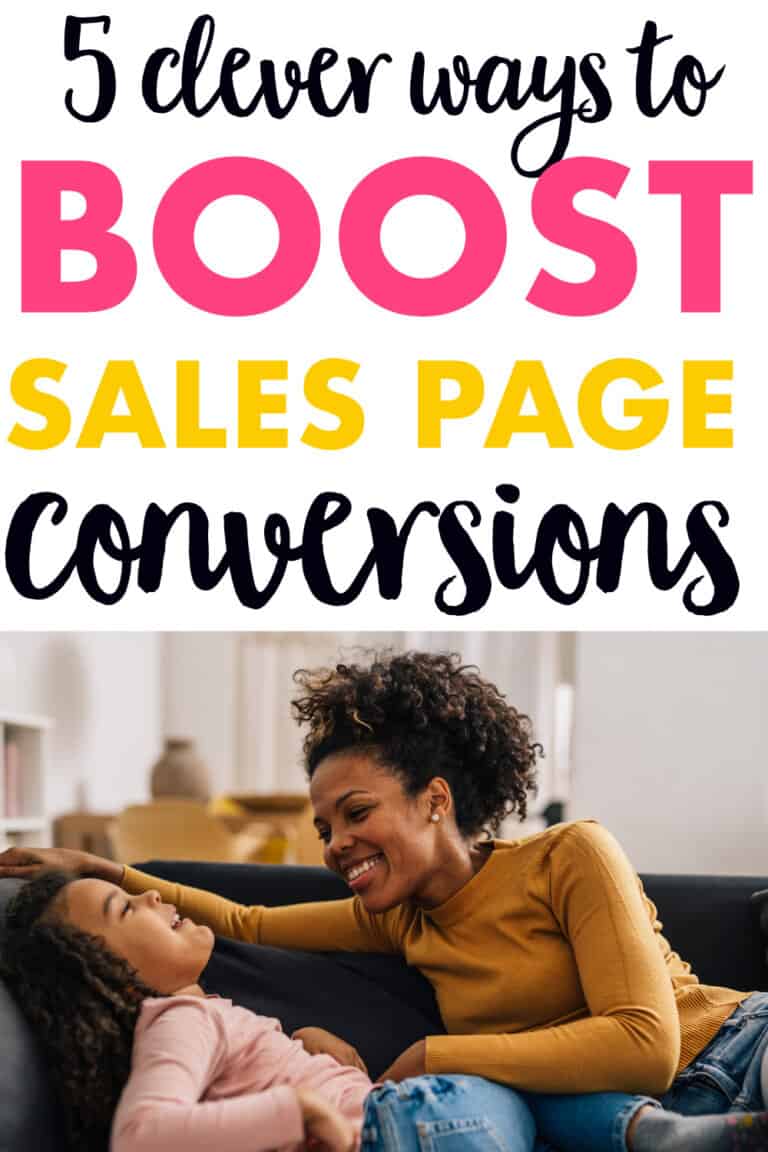
But, after a few hours and no sales, you don’t understand why our product isn’t selling like wildfire.
No one is buying, but it’s not because your product isn’t fantastic, it’s because your sales page is falling flat with your audience.
As a blogger and copywriter, I’ve had my fair share of writing sales pages for my digital products.
I’ve also read many bloggers’ sales pages and see that many had some misses that probably hurt their conversions.
So, if your sales page isn’t converting like you want it to, here’s how to fix that.
1. You Don’t Have a Gripping Headline
The first thing a person is going to read on your sales page will be your headline and if it doesn’t pique their interest or hook them to read more, you’ve potentially lost a sale.
And according to Copyblogger, 80% of people will read your headline, but only around 20% of them will keep reading until the end.
Changing your headline is the easiest thing you can do to increase your conversions. If Neil Patel was able to increase his conversions by 40% for Kissmetrics, then you can at least tweak your headline for better conversions.
Let’s look at three different types of headlines you can use for your sales page copy that will actually convert your visitors.
1. Have a Solution-Based Headline
Your headline has to immediately confirm to the reader they are in the right place.
If they’re looking for information on hand lettering and your headline screams calligraphy, your copy will not convert.
An easy way to ensure you’re speaking to your ideal buyer is to offer a solution to their problems.
Solving your buyer persona’s problems can help boost your conversion rates.
Let’s check out some high-converting, problem-solution headlines.
ConvertKit
ConvertKit is a popular email service provider developed my Nathan Barry.
It’s had some inital big wins with popular bloggers like Pat Flynn, Abby Lawson and Mariah Coz switching to ConvertKit.
But, that didn’t happen overnight. Nathan actually started with marketing to authors since he himself is a writer and author.
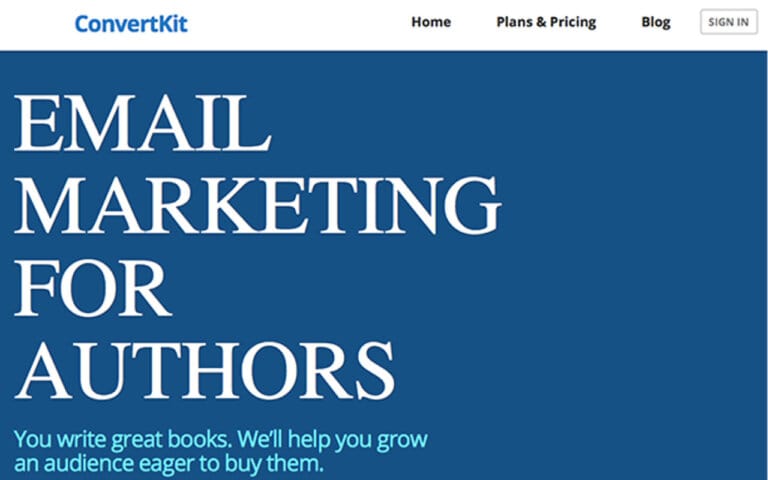
While he did generate revenue using this angle, Nathan quickly realized that authors just wasn’t the best market for his SaaS product.
In early 2015, he made the switch to target only bloggers using his tried and true solution-based headline.
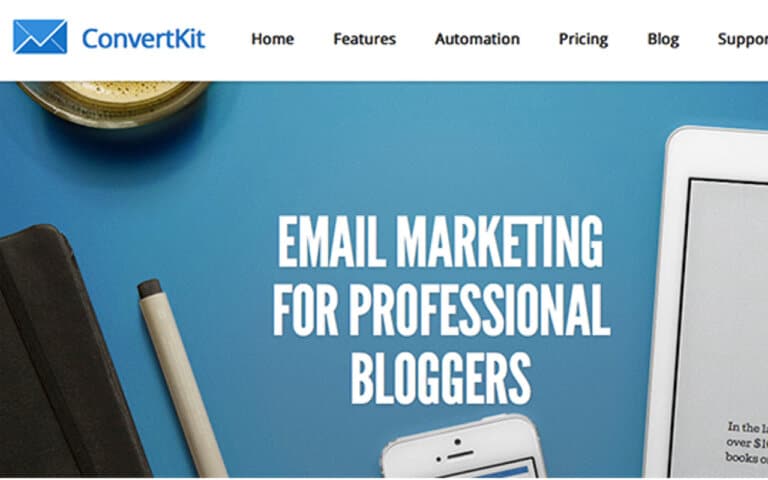
And now?
He combined bloggers, authors, entrepreneurs into one category: creators.
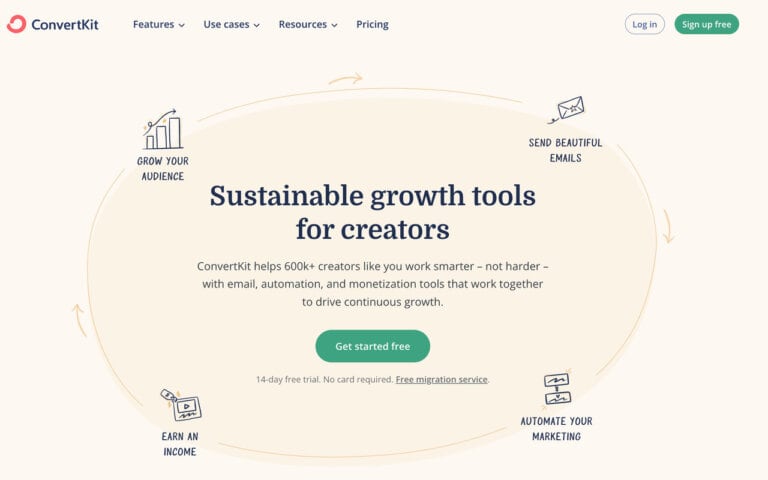
It’s a simple headline yet highly effective.
Many creators don’t have a large team of 50+ people.
They are typically a solopreneur and don’t need a highly complicated email provider that’s made for larger businesses.
Nathan is able to speak to professional creators’ concerns with his headline and how his product is tailor made for bloggers.
This new headline has proven to be converting at a high rate.
Soliloquy
Soliloquy is a WordPress slider plugin developed by Thomas Griffin, who is also one of the people behind OptinMonster.
The success of his WordPress plugin was first attributed to first-hand adopters with Genesis developers and Syed Balki supporting Soliloquy early on.
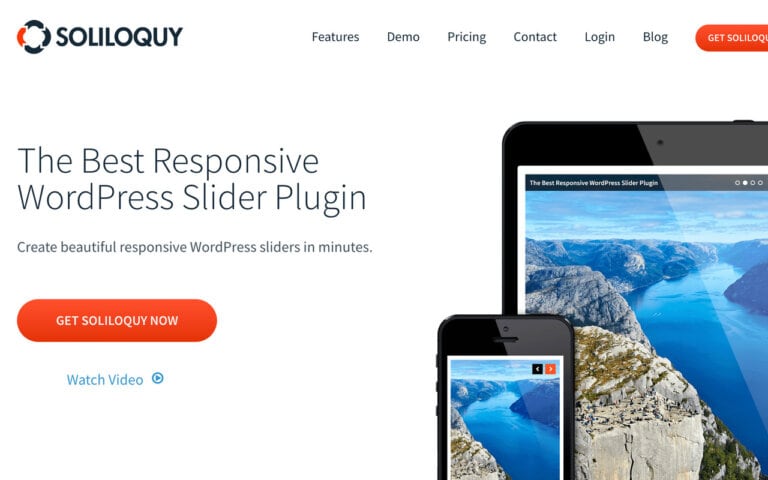
Having a solution based headline – as well as a strong content marketing strategy – helped in generating enough income for Thomas.
Thomas understood the frustration bloggers and entrepreneurs faced when using a slider plugin that was unreliable, and time consuming.
Soliloquy solves the problem of unreliable slider plugins.
To create a solution-based headline, figure out what your buyer persona’s biggest problem is and what their ideal solution would be.
2. Have a Benefit-Based Headline
Do you know what people love more than solving their problems?
They love the idea of having a better version of themselves.
Everyone wants to be better in his or her work and life. Your headline can show people the benefits of having your product or service.
Let’s look at a couple of effective benefit driven headlines.
Simple Pin Media
Kate Ahl created Simple Pin Media and over the years has created a team to help businesses with their agency.
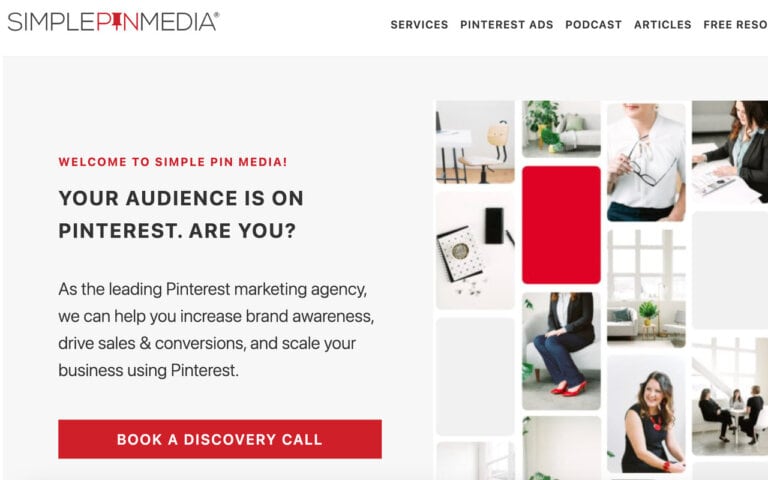
With Simple Pin Media, the headline builds curiosity but then hits you hard with the benefit of being on Pinterest: drive sales and conversions to scale your business.
They are slightly using FOMO (fear of missing out) to ask if your business is on Pinterest and if not you are missing out big time (the benefits).
Writeto1k
My course, Write Your Way to Your First $1k has a benefit headline on the sales page.
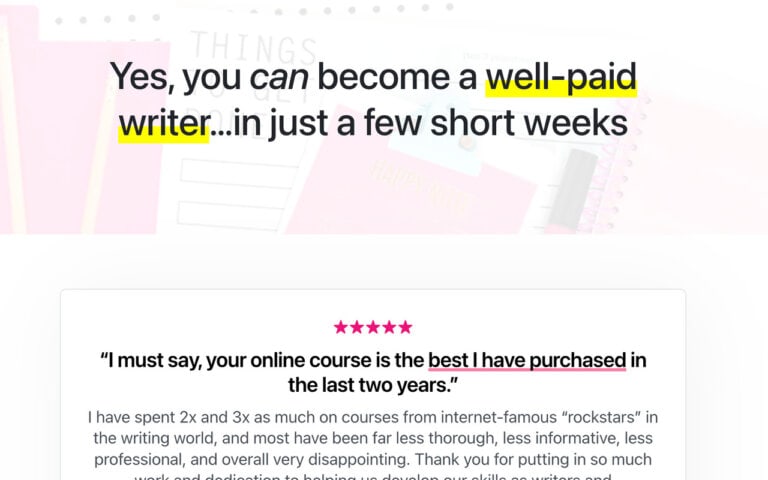
This course has helped me become a six-figure (now seven-figure) blogger and this sales page has a lot of reasons why this happened too.
This headline is entirely benefit-driven and it makes it easy for people to see if this course is for them.
When the average minimum wage is $12 per hour, the thought of making thousands per month (or with one article) is pretty enticing.
When coming up with your benefit-based headline, think about the end result of your product or service.
What will a buyer get out of your course or eBook or coaching program?
3. Statement Based Headline
Sometimes just stating the fact on what your product or service does is enough for conversions.
People don’t have time to learn about your brand and what exactly you do in your business. When, the visit your landing page or sales page, having a direct statement makes it easy for them to see what you do.
Let’s look at two statement-based headlines that are high converting.
Brilliant Business Moms Holiday Freebie Creation
Beth Anne is a mom who creates lots of digital templates and planners.
Many of her sales pages for these templates are statement-driven.
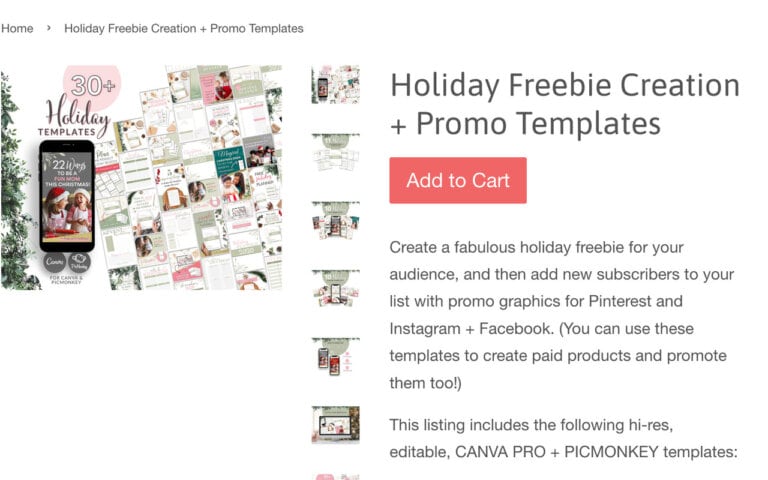
People need to know what the product is and what they are getting.
For many types of guides, templates and scripts, all you need is a statement headline to be effective.
Sarah Titus Planners
Sarah Titus is a mom blogger and she’s created a million dollar business with all her printables! Because of this, her sales pages are minimal and statement-driven.
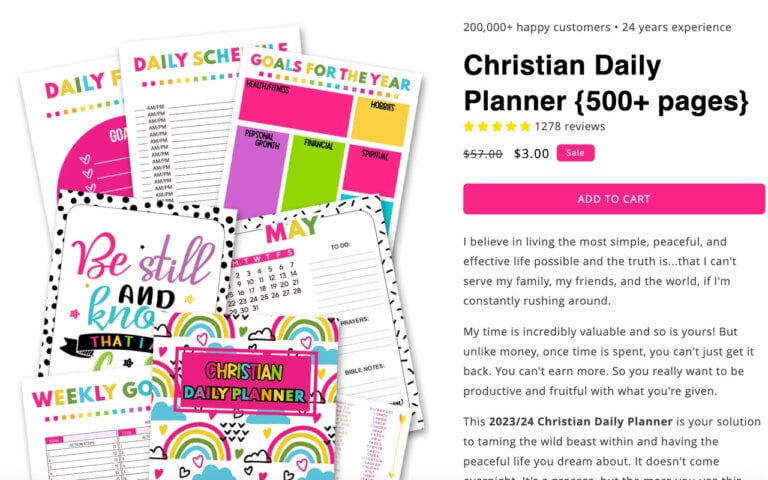
She has soo many products that people are only interested in WHAT they are getting and not WHY they should.
2. Your Sales Page is Too Short
If your sales page isn’t converting, it might be too brief.
You have to give as much as needed context to help readers understand why they can’t live without your product.
And the best way to do this is to focus on the benefits of your product.
- How does your product move a person from point A to point B?
- What will a person get out of using your product?
- What changes does the product allow for a person/business?
It’s crucial to go beyond listing features by explaining how these features can make a tangible difference in your customers’ lives.
This is where storytelling can be effective as well as testimonials.
Testimonials act as evidence that your product lives up to its promises, building trust and credibility.
Over on my sales page, I share my story of becoming and mom and how I couldn’t just leave my twins at home while I went away to work.
I then sprinkled in a testimonial to really make an impact with the reader.
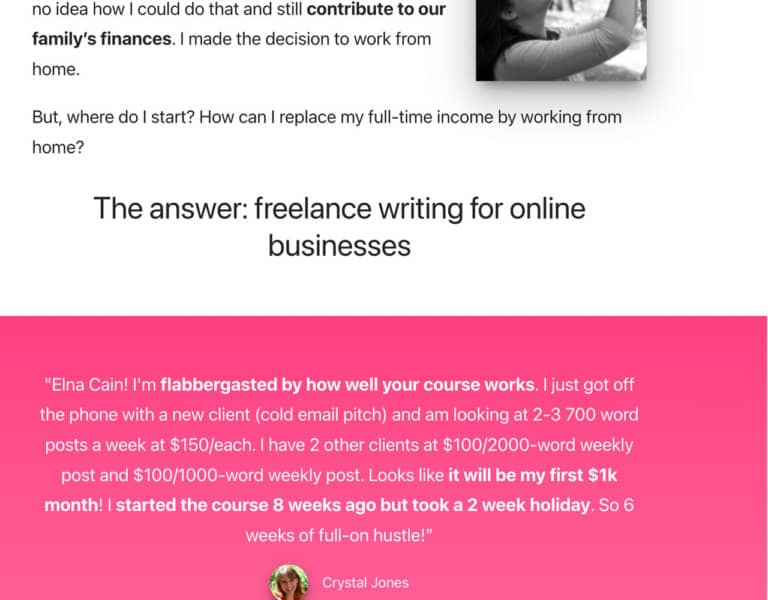
Think like your reader: what hesitations might they have?
A well-thought-out sales page should always answer these questions to build trust with the reader.
Every feature you boast about should come with an explanation of its benefit.
It’s not just about what the product has, but why that matters for your reader.
Addressing common objections upfront can dismantle barriers to purchase.
There are many objections as to why a person may not buy your course or digital product but the most popular ones are:
- Price: Your product is too expensive, or the buyer doesn’t see enough value for the cost.
- Need: The buyer doesn’t feel a pressing need for the product or believes they can do without it.
- Urgency: There’s no immediate reason for the buyer to act now; they might think it’s better to wait.
- Trust: The buyer isn’t sure about the quality or reliability of the product or the credibility of the seller.
Whether it’s about price or usability, clear those hurdles in your copy.
Don’t forget to make your sales page a journey, with a beginning, middle, and a powerful call to action.
This narrative should guide potential customers to an informed and confident purchase decision.
Remember, a comprehensive sales page isn’t just about length; it’s about crafting a narrative that connects with your readers at every stage of their decision-making process.
3. The Price is Too High (Or Too Low)
Did you struggle with finding the right price for your product?
I know I still do!
I do feel I price my products too low so I’m working on gaining more confidence to price my products higher.
So, I don’t think it’s hurting my conversions though.
But, if you’ve noticed that potential buyers are hesitant, it might be a signal that your price point isn’t hitting home.
If your product is priced on the higher end, does your sales page lay out the COMPLETE value your product has?
If it doesn’t then people won’t pay the price you are asking for.
There’s also a HUGE trust factor to and that typically means building a loyal audience over time.
If you are in month 1 of blogging and decided to come out with a $5,000 3 week coaching program, you may not get a lot of hits.
Why?
Because you haven’t proven trust with your brand yet. It will take time.
But make sure your sales page is crystal clear in how your offer eases pain points or brings joy, just like showing the horsepower behind a luxury car.
And, if your price is on the lower end, it’s equally important to reassure your readers that the quality isn’t compromised.
This could be my problem.
They might be second-guessing the deal — wondering if there’s a hidden flaw.
It’s important to be transparent about why your offer is so accessible.
Perhaps you’re running an introductory promo or a limited-time offer as a way of saying thanks to your community.
Remember, your sales page is the bridge between your product and your customer’s needs.
Pricing should feel like a fair exchange of value for the solutions provided.
Your goal is to align your price with the perceived benefits, so when a fellow mom blogger lands on your page, she nods in agreement and thinks, “This is exactly what I’ve been looking for.”
One way to mitgate all of this is to use a three tier pricing structure.
This is often termed the goldilocks approach.
You have a low offer or base offer, a too high of an offer and in the middle? The just right offer.
I did this early on when I created my first course and digital product.
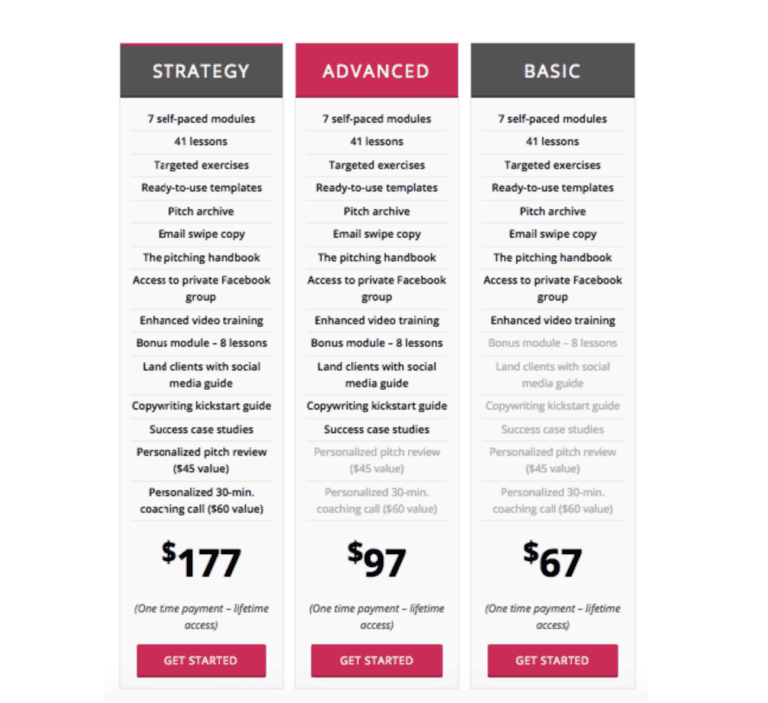
This helped people see the VALUE my course had.
4. It’s Written Poorly
If you’ve got a hunch that your sales page isn’t converting, it could be down to the words you’re using, or maybe the ones you’re not.
A poorly written sales page can confuse, bore, or even deter your audience.
I’ve seen many sales pages from bloggers and to be honest, many of them were poorly written.
They weren’t clear in the benefits and features and
That’s not what we want, right?
Let’s get into how you can write copy that connects and converts.
The #1 thing I use are copywriting principles.
Enter PAS (Problem-Agitate-Solution) and AIDA (Attention-Interest-Desire-Action).
Using PAS, you start by pinpointing a problem your fellow mom bloggers are facing.
Let’s say it’s the never-ending struggle of keeping toys organized.
You’d empathize with this challenge, then twist the knife a bit — agitate by highlighting the daily frustration of stepping on a rogue LEGO.
Finally, you offer the solution: your toy organization system that promises a Lego-free walkway.
AIDA, on the other hand, is another popular copywriting principle that can help you boost conversions easily.
First, you grab their Attention with a headline that pops, like “Say Goodbye to Toy-Induced Foot Pain!”
Then you pique their Interest with intriguing facts or a personal anecdote.
You build Desire by painting a picture of a clutter-free playroom.
And finally, you prompt Action with a can’t-miss call to action: “Order now for a peaceful, pain-free play area!”
Whether it’s PAS or AIDA, the key is to craft your copy so it flows as naturally as a conversation over coffee.
You’re not just selling a product; you’re providing a path to a more serene life that every mom – or whoever your audience is – craves.
And that’s something that’ll make your sales page not just well-written, but truly compelling.
5. You’re Forgetting the Benefits
I touched on this during the headline topic, but it’s important to drill this in – people don’t buy the features of something like how a low-flow toilet has a cute handle and sturdy base.
No – you buy a low-flow toilet to save money and the environment – those are the benefits.
When crafting your sales page, it’s important to make the benefits of your product front and center over its features.
Start by pinpointing the most important advantages your product offers.
Instead of merely listing the technical aspects, talk about how these features enhance your audience’s life.
For example, if you’re selling an online course with lifetime access, emphasize the convenience of learning at their own pace and the ability to revisit the material whenever necessary.
This is taking a feature and turning that into a benefit.
But, emotional benefits are just as crucial.
Connect with your readers by addressing how your product can improve their emotional well-being, whether it’s reducing stress, boosting confidence, or enhancing happiness.
Present these benefits in an easily digestible format, such as bullet points, to ensure they stand out and are easily understood.
I try to weave this emotional benefits throughout my sales pages.
This can help get your audience to read your sales page all the way through.
I’ve Made a Million With Sales Pages
Look –
I have several digital products but the ones that have made me the most money – and ultimately a millionaire – are the ones with a hefty sales page.
It’s not that these people are on my email list, read my blog posts or watch my Youtube videos.
That’s not enough (it’s a big help though).
It’s the convincing writing I do on my sales page.
I tap into their emotions and talk to them as if I’m their friend.
I hope these five ways to boost sales on your sales page was helpful!
Tell me what you’re struggling with or which one you want to adopt in the comments!
I’d love to know.




Leave a Reply